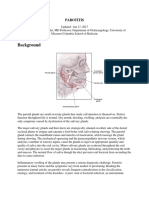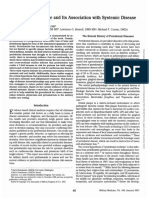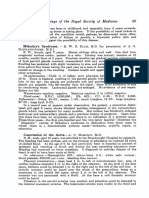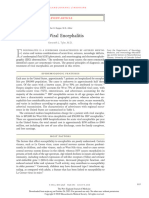0 ratings0% found this document useful (0 votes)
20 viewsMermh1Atotogp.: Sbection
Mermh1Atotogp.: Sbection
Uploaded by
gugicevdzoceThis document summarizes three patient cases presented at a dermatology section meeting. The first case describes a 29-year-old male with urticaria pigmentosa, an eruption of small red and blue macules on his trunk and limbs. A biopsy showed mast cell infiltration. The second case is an 11-year-old girl who previously had pityriasis rubra pilaris that cleared up, and now presents with psoriasis. The third case involves a 10-year-old boy with grey-yellow patches on his tongue and lips since age 16 months, as well as mouth fissures. Monilia or streptococcal infection is suggested as a possible cause.
Copyright:
© All Rights Reserved
Available Formats
Download as PDF, TXT or read online from Scribd
Mermh1Atotogp.: Sbection
Mermh1Atotogp.: Sbection
Uploaded by
gugicevdzoce0 ratings0% found this document useful (0 votes)
20 views1 pageThis document summarizes three patient cases presented at a dermatology section meeting. The first case describes a 29-year-old male with urticaria pigmentosa, an eruption of small red and blue macules on his trunk and limbs. A biopsy showed mast cell infiltration. The second case is an 11-year-old girl who previously had pityriasis rubra pilaris that cleared up, and now presents with psoriasis. The third case involves a 10-year-old boy with grey-yellow patches on his tongue and lips since age 16 months, as well as mouth fissures. Monilia or streptococcal infection is suggested as a possible cause.
Original Title
2
Copyright
© © All Rights Reserved
Available Formats
PDF, TXT or read online from Scribd
Share this document
Did you find this document useful?
Is this content inappropriate?
This document summarizes three patient cases presented at a dermatology section meeting. The first case describes a 29-year-old male with urticaria pigmentosa, an eruption of small red and blue macules on his trunk and limbs. A biopsy showed mast cell infiltration. The second case is an 11-year-old girl who previously had pityriasis rubra pilaris that cleared up, and now presents with psoriasis. The third case involves a 10-year-old boy with grey-yellow patches on his tongue and lips since age 16 months, as well as mouth fissures. Monilia or streptococcal infection is suggested as a possible cause.
Copyright:
© All Rights Reserved
Available Formats
Download as PDF, TXT or read online from Scribd
Download as pdf or txt
0 ratings0% found this document useful (0 votes)
20 views1 pageMermh1Atotogp.: Sbection
Mermh1Atotogp.: Sbection
Uploaded by
gugicevdzoceThis document summarizes three patient cases presented at a dermatology section meeting. The first case describes a 29-year-old male with urticaria pigmentosa, an eruption of small red and blue macules on his trunk and limbs. A biopsy showed mast cell infiltration. The second case is an 11-year-old girl who previously had pityriasis rubra pilaris that cleared up, and now presents with psoriasis. The third case involves a 10-year-old boy with grey-yellow patches on his tongue and lips since age 16 months, as well as mouth fissures. Monilia or streptococcal infection is suggested as a possible cause.
Copyright:
© All Rights Reserved
Available Formats
Download as PDF, TXT or read online from Scribd
Download as pdf or txt
You are on page 1of 1
sBection of Mermh1atotogp.
[February 21, 1929.]
Urticaria Pigmentosa in an Adult.-J. E. M. WIGLEY, M.B.-Patient, a
healthy male, aged 29, has had the present eruption for about four years. It does
not cause itching nor does it give rise to any symptoms. He had syphilis ten years
ago, for which he received treatment, and a Wassermann reaction, in June, 1928,
proved negative.
The eruption consists of small red and bluish macules scattered over the trunk,
and, to a less extent, over the upper limbs. The lesions become definitely turgescent
on friction (" urtication "). No factitious urticaria or dermographism is present.
A biopsy showed slight pigmentation of the basal layer, and a moderate number
of mast cells."
Pityriasis Rubra Pilaris followed by Psoriasis.-J. E. M. WIGLEY, M.B.
Patient, a healthy girl, aged 11, presents typical lesions of psoriasis on the scalp,
forehead, arms and trunk. She was previously shown at this Section in January,
1925, when the diagnosis of pityriasis rubra pilaris was made. That condition
cleared up, in spite of, rather than because of treatment, and she re-appeared with the
l)resent eruption during the course of the last month. The alternation of these
diseases, mentioned by most writers, is thus illustrated.
Dr. GRAHAM LITTLE said he had shown a case of this kind not many months ago; but
the psoriasis appeared first, and was followed by pityriasis rubra pilaris. He did not regard
them as identical diseases.
Infection of Tongue and Lips (?) Monilia.-Shown for Diagnosis.-J. E. M.
WIGLEY, M.B.-Patient, a healthy boy, aged 10, has had the present condition of
his tongue since the age of 16 months. It does not seem to cause him any
appreciable pain or discomfort, and his mother says that it does not vary in appear-
ance from time to time.
The tongue is large and pale, with a thickened smooth surface, traversed by
several fissures of moderate depth. On the surface are several greyish-yellow
patches, varying in size from that of a pin's head to that of a threepenny piece, and
having the appearance of "wash-leather." They are situated on the dorsum and
sides of the tongue, whilst there are some smaller patches on the hard palate.
The patches cannot be rubbed off, are not painful, and do not vary in size.
Deep rhagades are present at both angles of the mouth, which are always wet
with saliva. He has mild blepharitis, and some scurf on his head.
The Wassermann reaction has been negative on several occasions, and a course
of anti-syphilitic treatment has yielded no effect.
I suggest that the rhagades are due to a chronic monilia or streptococcal
infection from the dribbling saliva, but whether the condition of the tongue is of
the same nature I cannot say.
Discussion.-Dr. J. M. H. MAcLEoD (President) said he believed that the lesions at the
corner of the mouth were " perleche." He asked whether the tongue had been examined for
Imonilia; if not, this ought to be done.
Dr. J. A. DRAKE said this might be a chronic streptococcal glossitis in association with
the fissuring. He had seen anti-streptococcal serum used locally for suph a condition, wvith
fair results.
JUNE-DERM, 1
You might also like
- КРОК 02.2024 Мед, Стом, Фарм - Анг, УкрDocument22 pagesКРОК 02.2024 Мед, Стом, Фарм - Анг, УкрpharmacologyNo ratings yet
- 058-80 BTL-4000 Smart&Premium User Manual EN206Document72 pages058-80 BTL-4000 Smart&Premium User Manual EN206Sayed AlmokalyNo ratings yet
- Ds 2053 Medical Examination Immigrant VisaDocument8 pagesDs 2053 Medical Examination Immigrant VisaangelgirlfabNo ratings yet
- Acute Kidney InjuryDocument35 pagesAcute Kidney InjuryMuhrawi Yunding100% (1)
- NCP Heart FailureDocument2 pagesNCP Heart FailureDayan Cabriga100% (2)
- Yoga Therapy - A Personalized Approach For Your Active Lifestyle PDFDocument249 pagesYoga Therapy - A Personalized Approach For Your Active Lifestyle PDFfey100% (4)
- Riga-Fede Traumatic LingualDocument5 pagesRiga-Fede Traumatic LingualrlagistaNo ratings yet
- Procrsmed00859 0107Document16 pagesProcrsmed00859 0107sundaywentNo ratings yet
- Stomattis in ChildhoodDocument12 pagesStomattis in Childhoodtj_sweetgirlNo ratings yet
- PathologyDocument49 pagesPathologyWarisha AmirNo ratings yet
- Chee Hoe KitDocument7 pagesChee Hoe KitsilvernymphNo ratings yet
- Articles Fernand Montreuil1949 Cyst of The Nasal VestibuleDocument8 pagesArticles Fernand Montreuil1949 Cyst of The Nasal Vestibuledieynaba baNo ratings yet
- Laryngoscope ArticleDocument4 pagesLaryngoscope ArticleGeorge MastorakisNo ratings yet
- Oral Findings in Secondary Syphilis: Zela Puteri Nurbani 1506668694Document15 pagesOral Findings in Secondary Syphilis: Zela Puteri Nurbani 1506668694adnanfananiNo ratings yet
- Lesion IdentificationDocument8 pagesLesion Identificationapi-642711990No ratings yet
- Oral Manifestations of SyphilisDocument7 pagesOral Manifestations of SyphilishunarsandhuNo ratings yet
- Jurnal MCP2Document4 pagesJurnal MCP2RENITA USWATUN HASANAH 1No ratings yet
- Pringle 1915 Case of A Lichenous Eruption For Diagnosis (Pityriasis Rubra Pilaris)Document3 pagesPringle 1915 Case of A Lichenous Eruption For Diagnosis (Pityriasis Rubra Pilaris)Kata TölgyesiNo ratings yet
- Prurigo HebraDocument2 pagesPrurigo HebraFirdaus SaputraNo ratings yet
- Contents:: Infectious DiseasesDocument87 pagesContents:: Infectious DiseasesdrnainagargNo ratings yet
- SCMS V34i4 White Lesions in The Oral CavityDocument10 pagesSCMS V34i4 White Lesions in The Oral CavityTasneem Hussiny AbdallahNo ratings yet
- White Sponge NevusDocument2 pagesWhite Sponge Nevusbundahara zoomNo ratings yet
- Lepromatous Leprosy: A Review and Case ReportDocument7 pagesLepromatous Leprosy: A Review and Case ReportCaesar DamingNo ratings yet
- OsteomyelitisDocument2 pagesOsteomyelitisdoctorniravNo ratings yet
- Dental Update 1999. Orofacial Disease. Update For The Dental Clinical Team. 6. Complaints Affecting Particularly The Lips or TongueDocument6 pagesDental Update 1999. Orofacial Disease. Update For The Dental Clinical Team. 6. Complaints Affecting Particularly The Lips or TonguemirfanulhaqNo ratings yet
- Verruca Vulgaris in A Non-Immunocompromised Patient: Case ReportDocument4 pagesVerruca Vulgaris in A Non-Immunocompromised Patient: Case ReportBryan Eliezer SitumorangNo ratings yet
- Lichen Planus of Lip - Report of A Rare Case With Review of LiteratureDocument7 pagesLichen Planus of Lip - Report of A Rare Case With Review of LiteratureDharmapadmi KasilaniNo ratings yet
- Oral MedicineDocument4 pagesOral MedicineRizki Dwi LestariNo ratings yet
- Rhabdomyosarcoma of The Nasopharynx!: Elmer G. St. John, M.D., and Zung-Pah Woo, M.DDocument5 pagesRhabdomyosarcoma of The Nasopharynx!: Elmer G. St. John, M.D., and Zung-Pah Woo, M.DDhanoush MşđNo ratings yet
- Oral Pathology_240903_011939Document8 pagesOral Pathology_240903_011939Roaa AlrawashdehNo ratings yet
- HY GastrointestinalDocument95 pagesHY Gastrointestinalfeven77mekNo ratings yet
- oral ulcers part 2Document56 pagesoral ulcers part 2kkholoud961No ratings yet
- S217357350770296XDocument3 pagesS217357350770296XNguyễn Mạnh LinhNo ratings yet
- Only Café Au Lait Macule Variant of Neurofibromatosis Without Neurofibroma: A Rare Case ReportDocument2 pagesOnly Café Au Lait Macule Variant of Neurofibromatosis Without Neurofibroma: A Rare Case ReportHowthul AlamNo ratings yet
- Background: ParotitisDocument23 pagesBackground: ParotitisifahInayah100% (1)
- Herpes Zoster Oticus in A 12 Year Old Child and Review of Literature - A CaseDocument5 pagesHerpes Zoster Oticus in A 12 Year Old Child and Review of Literature - A CaseClodeyaRizolaNo ratings yet
- Lymphangioma of The TongueDocument3 pagesLymphangioma of The TonguesevattapillaiNo ratings yet
- Childhood Granulomatous Periorificial DermatitisDocument4 pagesChildhood Granulomatous Periorificial DermatitisNiaUlfaAngreiniTambunanNo ratings yet
- Syphilis in PregnancyDocument4 pagesSyphilis in PregnancyBright KumwendaNo ratings yet
- Jurnalnya YeayDocument9 pagesJurnalnya YeayNurazizah SoorayaNo ratings yet
- Secondary Syphilis Presenting As Atypical Oral Ulceration A CaseDocument3 pagesSecondary Syphilis Presenting As Atypical Oral Ulceration A CasebkprosthoNo ratings yet
- Pemfigus VulgarisDocument5 pagesPemfigus VulgarisAgus LarobuNo ratings yet
- Major Recurrent Aphthous Stomatitis in Mother and Son With Hiv/Aids Infection - CaseDocument4 pagesMajor Recurrent Aphthous Stomatitis in Mother and Son With Hiv/Aids Infection - CaseZita AprilliaNo ratings yet
- HY GastrointestinalDocument92 pagesHY GastrointestinalJeniNo ratings yet
- Journal BiluDocument30 pagesJournal BiluBency Benjamin MachadNo ratings yet
- UlcerativeDocument250 pagesUlcerativeSamridhi SrivastavaNo ratings yet
- Atypical TuberculosisDocument3 pagesAtypical TuberculosisWilda Khairani DalimuntheNo ratings yet
- Bacterial Viral Mycotic Infections Affecting Oral CavityDocument105 pagesBacterial Viral Mycotic Infections Affecting Oral CavityViral ParekhNo ratings yet
- Abnormal Findings of Mouth and NeckDocument68 pagesAbnormal Findings of Mouth and NeckNuhu BankwhotNo ratings yet
- SyphilisDocument6 pagesSyphilisMuthia HannisaNo ratings yet
- Nassef2015 PDFDocument6 pagesNassef2015 PDFBilel DhaouadiNo ratings yet
- +3a Lamyae Jaich HOPMDocument11 pages+3a Lamyae Jaich HOPMghitakabbageNo ratings yet
- Exclusive Primary Lesion of Oral Leishmaniasis 2016Document5 pagesExclusive Primary Lesion of Oral Leishmaniasis 2016MARIE SELENE RAMIREZ REVOLLARNo ratings yet
- PV 1Document4 pagesPV 1Aing ScribdNo ratings yet
- Ijgmp - Medicine - Clinic-Pathological Profile of Sinonasal MassesDocument12 pagesIjgmp - Medicine - Clinic-Pathological Profile of Sinonasal Massesiaset123No ratings yet
- Acute Gingival LesionsDocument27 pagesAcute Gingival LesionsNitin GuptaNo ratings yet
- Giant Epidermoid Cyst of The Floor of Mouth: LT LTDocument3 pagesGiant Epidermoid Cyst of The Floor of Mouth: LT LTKharismaNisaNo ratings yet
- Fissured Tongue: A Case Report and Review of Literature: KeywordsDocument5 pagesFissured Tongue: A Case Report and Review of Literature: Keywordssiti baiq gadishaNo ratings yet
- Oral Candidiasis As A Warning Sign of HIV/AIDS Infection: Case ReportDocument9 pagesOral Candidiasis As A Warning Sign of HIV/AIDS Infection: Case ReportSiti Fauziah PrihatiniNo ratings yet
- 2 MucorDocument6 pages2 Mucorarpitjain01020No ratings yet
- Sexually Transmitted Disease (STD)Document102 pagesSexually Transmitted Disease (STD)uhurtme100% (11)
- TRUE LYME: Understanding, Treating, and Thriving with Lyme Disease: A Comprehensive GuideFrom EverandTRUE LYME: Understanding, Treating, and Thriving with Lyme Disease: A Comprehensive GuideNo ratings yet
- Macrophages in Immunoregulation and Therapeutics: Signal Transduction and Targeted TherapyDocument35 pagesMacrophages in Immunoregulation and Therapeutics: Signal Transduction and Targeted TherapygugicevdzoceNo ratings yet
- Macrophages in Health and Disease: ReviewDocument21 pagesMacrophages in Health and Disease: ReviewgugicevdzoceNo ratings yet
- The Effects of Atropine and Neostigmine On Heart Rate and RhythmDocument9 pagesThe Effects of Atropine and Neostigmine On Heart Rate and RhythmgugicevdzoceNo ratings yet
- Urticarial Vasculitis Associated With Essential THDocument3 pagesUrticarial Vasculitis Associated With Essential THgugicevdzoceNo ratings yet
- Brain-Eating Ameba (Naegleria)Document2 pagesBrain-Eating Ameba (Naegleria)gugicevdzoceNo ratings yet
- Impact of Systemic Lupus Erythematosus On Oral Health-Related Quality of LifeDocument7 pagesImpact of Systemic Lupus Erythematosus On Oral Health-Related Quality of LifegugicevdzoceNo ratings yet
- Current Concepts in The Pathogenesis of Periodontitis: From Symbiosis To DysbiosisDocument20 pagesCurrent Concepts in The Pathogenesis of Periodontitis: From Symbiosis To DysbiosisgugicevdzoceNo ratings yet
- Advances in The Pathogenesis and Treatment of Systemic Lupus ErythematosusDocument23 pagesAdvances in The Pathogenesis and Treatment of Systemic Lupus ErythematosusgugicevdzoceNo ratings yet
- Pathogenesis of Systemic Lupus Erythematosus: Risks, Mechanisms and Therapeutic TargetsDocument16 pagesPathogenesis of Systemic Lupus Erythematosus: Risks, Mechanisms and Therapeutic TargetsgugicevdzoceNo ratings yet
- 2Document23 pages2gugicevdzoceNo ratings yet
- 1Document22 pages1gugicevdzoceNo ratings yet
- The Pathogenesis of Psoriasis: Insight Into A Complex "Mobius Loop" Regulation ProcessDocument6 pagesThe Pathogenesis of Psoriasis: Insight Into A Complex "Mobius Loop" Regulation ProcessgugicevdzoceNo ratings yet
- HHHHDocument5 pagesHHHHgugicevdzoceNo ratings yet
- Rheumatoid Arthritis: Pathogenesis, Clinical Features, and TreatmentDocument37 pagesRheumatoid Arthritis: Pathogenesis, Clinical Features, and TreatmentgugicevdzoceNo ratings yet
- Periodontal Disease and Its Association With Systemic DiseaseDocument5 pagesPeriodontal Disease and Its Association With Systemic DiseasegugicevdzoceNo ratings yet
- EeeeDocument2 pagesEeeegugicevdzoceNo ratings yet
- Ellis Maitland Jones 1932 Mikulicz S SyndromeDocument1 pageEllis Maitland Jones 1932 Mikulicz S SyndromegugicevdzoceNo ratings yet
- Porter Et Al 1998 Recurrent Aphthous StomatitisDocument16 pagesPorter Et Al 1998 Recurrent Aphthous StomatitisgugicevdzoceNo ratings yet
- Guideline On The Use of Pharmacokinetics and Pharmacodynamics in The Development of Antimicrobial Medicinal ProductsDocument17 pagesGuideline On The Use of Pharmacokinetics and Pharmacodynamics in The Development of Antimicrobial Medicinal ProductsgugicevdzoceNo ratings yet
- Acute Viral Encephalitis: Review ArticleDocument10 pagesAcute Viral Encephalitis: Review ArticlegugicevdzoceNo ratings yet
- A Short History of Japanese Historical Seismology: Past and The PresentDocument15 pagesA Short History of Japanese Historical Seismology: Past and The PresentgugicevdzoceNo ratings yet
- Myxo 1Document8 pagesMyxo 1gugicevdzoceNo ratings yet
- Academy 9. Cancer ImmunotherapyDocument23 pagesAcademy 9. Cancer ImmunotherapyTam Le Ngoc KhanhNo ratings yet
- DTM&H Parasitology & Entomology Sample Questions (1) - 0Document11 pagesDTM&H Parasitology & Entomology Sample Questions (1) - 0Gemechis MergaNo ratings yet
- مصطلاحات هندسية PDFDocument160 pagesمصطلاحات هندسية PDFHossam MakiNo ratings yet
- Nur 111 Session 17 Sas 1Document8 pagesNur 111 Session 17 Sas 1Zzimply Tri Sha UmaliNo ratings yet
- Causes: Respiratory Acidosis Respiratory AlkalosisDocument4 pagesCauses: Respiratory Acidosis Respiratory AlkalosisKristie Stiles100% (1)
- Final Test Session 2 Professional BSN, 4 Year Programme Subject: Adult Health Nursing I Topic: Unit I (Gastrointestinal System)Document8 pagesFinal Test Session 2 Professional BSN, 4 Year Programme Subject: Adult Health Nursing I Topic: Unit I (Gastrointestinal System)You TuberNo ratings yet
- Cue and Clue Problem List Idx PDX PTX Pmo PedDocument5 pagesCue and Clue Problem List Idx PDX PTX Pmo PedEmma FitrianaNo ratings yet
- Gouty NephropathyDocument18 pagesGouty NephropathyFreezingSoul FreezingSoulNo ratings yet
- PN2889050000702952Document5 pagesPN2889050000702952singhbhanuprakash28No ratings yet
- 12 Gate OpeningDocument4 pages12 Gate OpeningGermán Mariano Torrez G100% (1)
- Publication Keypopulations Actionplan enDocument20 pagesPublication Keypopulations Actionplan enWissam KhudairNo ratings yet
- Maternal and Child Nursing - Essential Intrapartum Newborn CareDocument8 pagesMaternal and Child Nursing - Essential Intrapartum Newborn CareSofia Resol100% (1)
- Sample Question Paper 2Document10 pagesSample Question Paper 2Raksha SoniNo ratings yet
- Immediate Download (Instruction Manual) Creating Environments For Learning Birth To Age Eight 2nd Edition All ChaptersDocument34 pagesImmediate Download (Instruction Manual) Creating Environments For Learning Birth To Age Eight 2nd Edition All Chaptersgroultedibe100% (6)
- Lakelandthisweek August 11 2020Document32 pagesLakelandthisweek August 11 2020Janice HuserNo ratings yet
- Pilapil Chapter 1Document13 pagesPilapil Chapter 1Belle ReyNo ratings yet
- Occupational Safety and Health Management in The Construction Industry A ReviewDocument30 pagesOccupational Safety and Health Management in The Construction Industry A Reviewasel ppNo ratings yet
- SPRITUAL Synopsis. FinalDocument14 pagesSPRITUAL Synopsis. Finalsapna chauhanNo ratings yet
- Knowledge, Attitude and Practice of Pilgrims Regarding Heat-Related Illnesses During The 2017 Hajj Mass GatheringDocument13 pagesKnowledge, Attitude and Practice of Pilgrims Regarding Heat-Related Illnesses During The 2017 Hajj Mass GatheringUsman Ahmad TijjaniNo ratings yet
- Contourez User Guide EnglishDocument35 pagesContourez User Guide EnglishGary HoehlerNo ratings yet
- Dengue Update - As of Aug. 9, 2019Document10 pagesDengue Update - As of Aug. 9, 2019CHICKYNo ratings yet
- Understanding Basic Principles of AyurvedaDocument8 pagesUnderstanding Basic Principles of AyurvedaEditor IJTSRDNo ratings yet
- Instant Ebooks Textbook (Ebook PDF) The Vascular System 2nd Edition Download All ChaptersDocument41 pagesInstant Ebooks Textbook (Ebook PDF) The Vascular System 2nd Edition Download All Chaptersbaseersaguna89% (9)
- NCM 118 - Lesson 8 (Acute Ischemic Heart Diseases)Document9 pagesNCM 118 - Lesson 8 (Acute Ischemic Heart Diseases)Bobby Christian DuronNo ratings yet















































































































